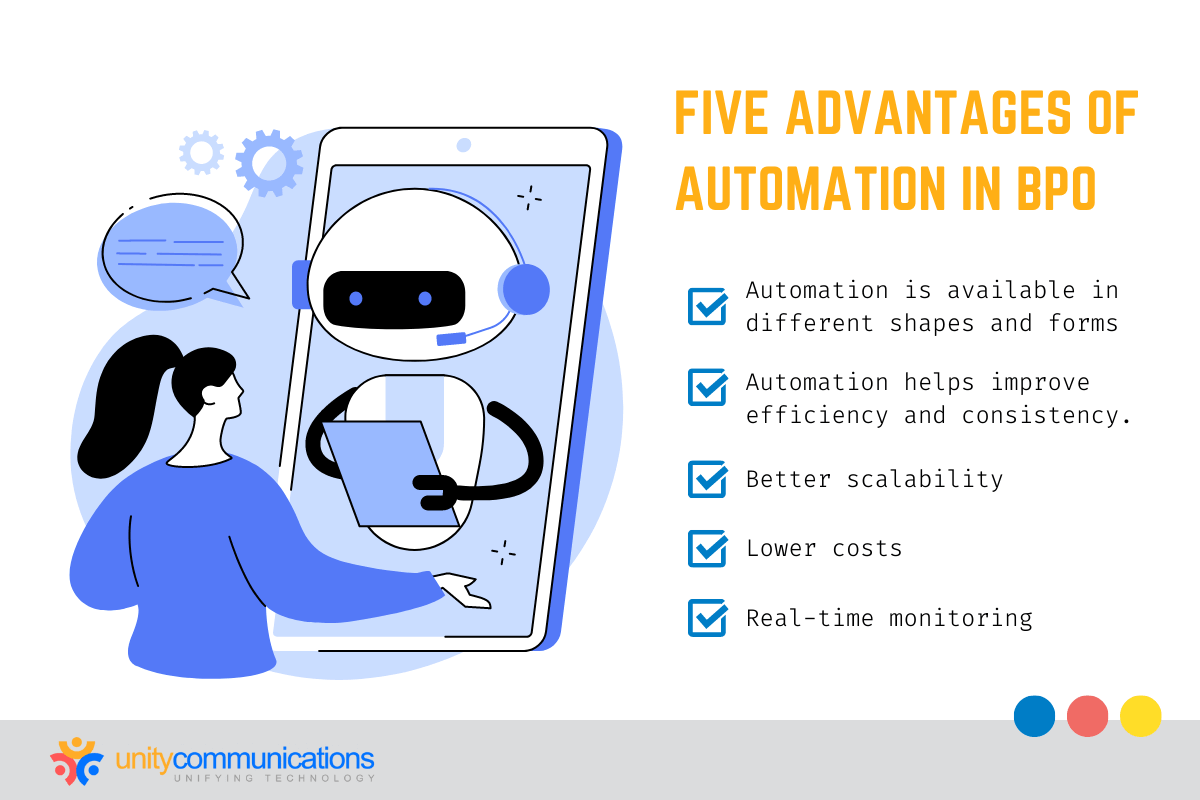Table of Contents
The business process outsourcing (BPO) industry is seeing a significant shift thanks to the rise of automation technologies. The industry is experiencing a growing trend toward using automation and artificial intelligence (AI) to handle outsourced processes. Clients of BPO companies might wonder how this development affects their outsourced functions.
This article explores how automation in the BPO industry affects outsourced work. It also discusses the advantages and disadvantages of this technology.
Automation in BPO Defined

What exactly is BPO? This business strategy involves contracting areas of operations to a third-party service provider. BPO tasks are divided between the front office and the back office.
Robotic process automation (RPA) uses software robots to perform rule-based functions across business areas. The use cases of RPA include expense management, data entry, and more. According to Automation Anywhere, a typical rule-based process can be automated by 70% to 80%.
RPA BPO refers to outsourcing vendors that use automation to reduce human errors, run operations faster, and improve workflow efficiency. BPO companies handle most business functions that are rule-based, repetitive back-end tasks that make excellent candidates for RPA. Here are examples of the best automation strategies in the BPO industry.
- Call center automation. This type of automation allows agents to concentrate on customers while bots handle the data legwork and seek approvals. AI in call centers can give right-sized information and step-by-step assistance to remote agents, enabling them to control access to confidential systems and minimize fraud rates and errors.
- RPA for back-office functions. RPA allows BPO providers to perform back-office functions—whether human resources (HR), payment processing, accounting, information technology (IT) services, quality assurance, or regulatory compliance—for clients with maximum accuracy and round-the-clock availability.
- Front-office augmentation. Automating manual processes across the front office, such as customer interactions, sales, and marketing, improves the customer experience by enhancing accuracy, efficiency, and speed of service delivery.
- Intelligent automation. Intelligent automation combines RPA and AI technologies, enhancing digital transformation and empowering rapid end-to-end business process automation.
The benefits of RPA for service providers are similar to the perks businesses get from using it. Discover the advantages of automation for the BPO industry and its clients in the next section.
Advantages of Automation in the BPO Industry

Here are the advantages of automation in the BPO industry and its effect on outsourcing clients:
Available in Different Shapes and Forms
Many automation tools, including chatbots, are readily accessible to assist BPO companies in delivering exceptional customer service and support to their end-users. For instance, the client company’s website often features a self-service page, which serves as the primary digital channel for customer engagement. According to a McKinsey report, this self-service option accounts for a substantial portion, ranging from 30% to 60% of self-help interactions.
End customers can access similar self-service alternatives for addressing straightforward issues without relying on agents for common inquiries. Furthermore, bots can assist by offering actionable self-help articles, deciphering the intent behind customer messages, and handling intricate requests through the utilization of machine learning (ML) and natural language processing (NLP) technologies.
Improved Efficiency and Consistency
RPA bots frequently surpass human staff in terms of consistency and efficiency. They can carry out repetitive tasks without experiencing fatigue, distraction, or lapses in concentration. Consistency plays a pivotal role, particularly in minimizing customer turnover and enhancing client retention.
As a result, BPO clients enjoy higher precision and efficiency in the services provided. When outsourcing providers secure clients, they can reciprocate the client’s trust by delivering unwavering performance in accordance with the contracted responsibilities.
Better Scalability
RPA-driven workflows empower service providers to accommodate new clients seamlessly, eliminating concerns about a shortage of personnel to meet rising demand.
Scalable RPA bots have the capability to perform identical tasks concurrently for multiple clients. For instance, a BPO company specializing in web scraping for e-commerce brands can manage an extensive client portfolio, provided they possess the required infrastructure and have programmed their bots accurately.
Lower Costs
Automation technology empowers outsourcing providers to delegate tasks that would otherwise require human intervention to bots. According to Gartner, automation can save up to 25,000 hours in a finance department alone. As bots assume a greater workload, BPO companies can curtail expenses and maintain a leaner workforce.
This advantage assumes greater significance, particularly in light of the escalating wages in offshore destinations. Consequently, outsourced work becomes less cost-effective for both the BPO provider and the client availing of the service.
Real-time Monitoring
Most outsourcing providers employ cloud-based, AI-infused software for their operations, providing clients with a transparent dashboard for live monitoring. This dashboard ensures that decision-makers within the client company have continuous access to insights regarding challenges, progress, and whether any supplementary steps are required to complete a process.
Additionally, RPA BPO offers client companies the advantage of mitigating challenges associated with time disparities. It eliminates the necessity of being within the same time zone, thus streamlining operations across different regions.
Disadvantages of Automation in the BPO Industry

Here are the disadvantages of automation in the BPO industry and its negative influence on outsourcing clients:
- Poorly implemented automation might be frustrating for customers. End users might be in a conversational loop with misguided bots and punish the business by leaving a bad review. After all, 60% of web users see poor customer service as a red flag for purchasing online, according to Insider Intelligence.
- RPA struggles with complex problems. Automation works best with rule-based, standardized requests. However, many cases require agent intervention. Moreover, according to PWC, 75% of customers prefer talking to a human, even if automation technologies improve. Only 3% prefer automated customer service.
- Automation is hard to configure. Installing AI-powered chatbots has risks since it is not a one-time purchase and requires a whole support system for maintenance and updates. The early stages of the implementation are done in a managed testing environment to avoid irritating end customers. Plus, the transition also requires adjustment.
The Bottom Line
Before automation in the BPO industry, outsourcing providers were valued for their economy and speed. Even though there were times when accuracy was at risk, human monitoring kept it safe.
Automation offers outsourcing vendors the capacity to maintain competitiveness and profitability in an ever-changing business climate. Thanks to the added advantage of automation, BPO companies enhance their ability to provide more value for their clients’ dollars.
Leverage an RPO BPO now to reduce operating costs, increase cost savings, and stay ahead of the competition. Let’s connect to discuss how a BPO partnership will benefit your business.




